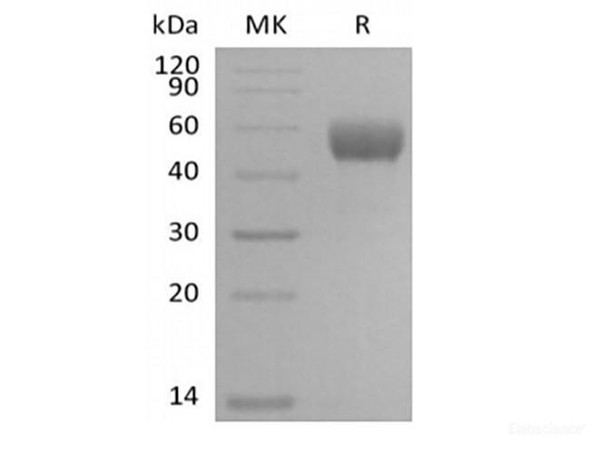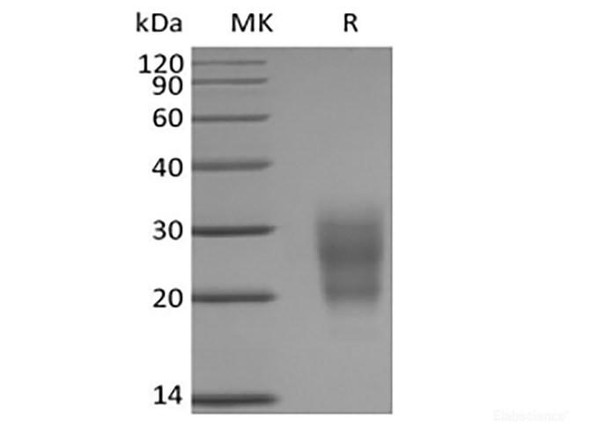Description
| Product Name: | Mouse NKG2-D type II Integral Membrane Recombinant Protein/NKG2D/CD314 (N-Fc) |
| Product Code: | RPES6640 |
| Size: | 10µg |
| Species: | Mouse |
| Expression Host: | HEK293 Cells |
| Synonyms: | CD314, KLRK1, CD314 antigen, Killer cell lectin-like receptor subfamily K member 1, killer cell lectin-like receptor subfamily K, member 1, KLR, NK cell receptor D, NKG2-D, NKG2-D type II integral membrane protein, NKG2-D-activating NK receptor, NKG2D |
| Mol Mass: | 42.2 kDa |
| AP Mol Mass: | 45-60 kDa |
| Tag: | N-Fc |
| Purity: | > 95 % as determined by reducing SDS-PAGE. |
| Endotoxin Level: | < 1.0 EU per μg of the protein as determined by the LAL method. |
| Bio Activity: | Testing in progress |
| Sequence: | Phe94 - Val232 |
| Accession: | O54709 |
| Storage: | Generally, lyophilized proteins are stable for up to 12 months when stored at -20 to -80°C. Reconstituted protein solution can be stored at 4-8°C for 2-7 days. Aliquots of reconstituted samples are stable at < -20°C for 3 months. |
| Shipping: | This product is provided as lyophilized powder which is shipped with ice packs. |
| Formulation: | Lyophilized from a 0.2 μm filtered solution of PBS, pH 7.4. Normally 5 % - 8 % trehalose, mannitol and 0.01% Tween80 are added as protectants before lyophilization. Please refer to the specific buffer information in the printed manual. |
| Reconstitution: | Please refer to the printed manual for detailed information. |
| Background: | NKG2-D type II integral membrane protein (NKG2D) is a type II transmembrane glycoprotein which belongs to the CD94/NKG2 family. NKG2D is expressed on natural killer (NK) cells, CD8+ alpha-beta and gamma-delta T-cells. As an activating and costimulatory receptor, it involved in immunosurveillance upon binding to various cellular stress-inducible ligands displayed at the surface of autologous tumor cells and virus-infected cells. It provides both stimulatory and costimulatory innate immune responses on activated killer (NK) cells, leading to cytotoxic activity. It stimulates perforin-mediated elimination of ligand-expressing tumor cells. Signaling involves calcium influx, culminating in the expression of TNF-alpha. NKG2D participates in NK cell-mediated bone marrow graft rejection and survival of NK cells. It Binds to ligands belonging to various subfamilies of MHC class I-related glycoproteins including MICA, MICB, RAET1E, RAET1G, ULBP1, ULBP2, ULBP3 (ULBP2>ULBP1>ULBP3) and ULBP4. |






